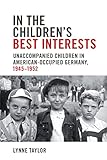In the Children's Best Interests : Unaccompanied Children in American-Occupied Germany, 1945-1952 / Lynne Taylor.
Material type: TextSeries: German and European StudiesPublisher: Toronto : University of Toronto Press, [2018]Copyright date: ©2017Description: 1 online resource (480 p.)Content type:
TextSeries: German and European StudiesPublisher: Toronto : University of Toronto Press, [2018]Copyright date: ©2017Description: 1 online resource (480 p.)Content type: - 9781487502355
- 9781487515157
- 940.53/161 23
- D810.C4 .T39 2017
- online - DeGruyter
| Item type | Current library | Call number | URL | Status | Notes | Barcode | |
|---|---|---|---|---|---|---|---|
 eBook
eBook
|
Biblioteca "Angelicum" Pont. Univ. S.Tommaso d'Aquino Nuvola online | online - DeGruyter (Browse shelf(Opens below)) | Online access | Not for loan (Accesso limitato) | Accesso per gli utenti autorizzati / Access for authorized users | (dgr)9781487515157 |
restricted access online access with authorization star
http://purl.org/coar/access_right/c_16ec
Among the hundreds of thousands of displaced persons in Germany at the end of World War II, approximately 40,000 were unaccompanied children. These children, of every age and nationality, were without parents or legal guardians and many were without clear identities. This situation posed serious practical, legal, ethical, and political problems for the agencies responsible for their care.In the Children's Best Interests, by Lynne Taylor, is the first work to delve deeply into the records of the United Nations Relief and Rehabilitation Administration (UNRRA) and the International Refugee Organization (IRO) and reveal the heated battles that erupted amongst the various entities (military, governments, and NGOs) responsible for their care and disposition. The bitter debates focused on such issues as whether a child could be adopted, what to do with illegitimate and abandoned children, and who could assume the role of guardian. The inconclusive nationality of these children meant they became pawns in the battle between East and West during the Cold War. Taylor's exploration and insight into the debates around national identity and the privilege of citizenship challenges our understanding of nationality in the postwar period.
Mode of access: Internet via World Wide Web.
In English.
Description based on online resource; title from PDF title page (publisher's Web site, viewed 01. Nov 2023)


